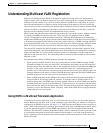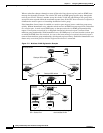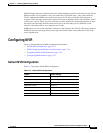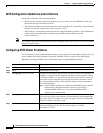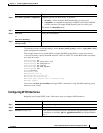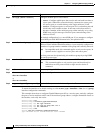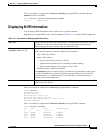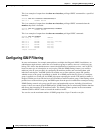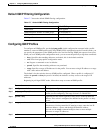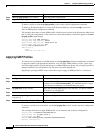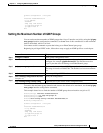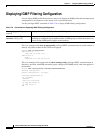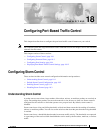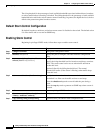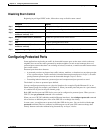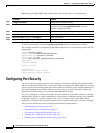
17-21
Catalyst 2950 Desktop Switch Software Configuration Guide
78-14982-01
Chapter 17 Configuring IGMP Snooping and MVR
Configuring IGMP Filtering
Default IGMP Filtering Configuration
Table 17-7 shows the default IGMP filtering configuration.
Configuring IGMP Profiles
To configure an IGMP profile, use the ip igmp profile global configuration command with a profile
number to create an IGMP profile and to enter IGMP profile configuration mode. From this mode, you
can specify the parameters of the IGMP profile to be used for filtering IGMP join requests from a port.
When you are in IGMP profile configuration mode, you can create the profile by using these commands:
• deny: Specifies that matching addresses are denied; this is the default condition.
• exit: Exits from igmp-profile configuration mode.
• no: Negates a command or sets its defaults.
• permit: Specifies that matching addresses are permitted.
• range: Specifies a range of IP addresses for the profile. You can enter a single IP address or a range
with a start and an end address.
The default is for the switch to have no IGMP profiles configured. When a profile is configured, if
neither the permit nor deny keyword is included, the default is to deny access to the range of IP
addresses.
Beginning in privileged EXEC mode, follow these steps to create an IGMP profile:
Table 17-7 Default IGMP Filtering Configuration
Feature Default Setting
IGMP filters None applied
IGMP Maximum number of IGMP groups No maximum set
IGMP profiles None defined
IGMP profile action Deny the range addresses
Command Purpose
Step 1
configure terminal Enter global configuration mode.
Step 2
ip igmp profile profile number Enter IGMP profile configuration mode, and assign a number to the
profile you are configuring. The range is from 1 to 4294967295.
Step 3
permit | deny (Optional) Set the action to permit or deny access to the IP multicast
address. If no action is configured, the default for the profile is to deny
access.
Step 4
range ip multicast address Enter the IP multicast address or range of IP multicast addresses to
which access is being controlled. If entering a range, enter the low IP
multicast address, a space, and the high IP multicast address.
You can use the range command multiple times to enter multiple
addresses or ranges of addresses.
Step 5
end Return to privileged EXEC mode.



